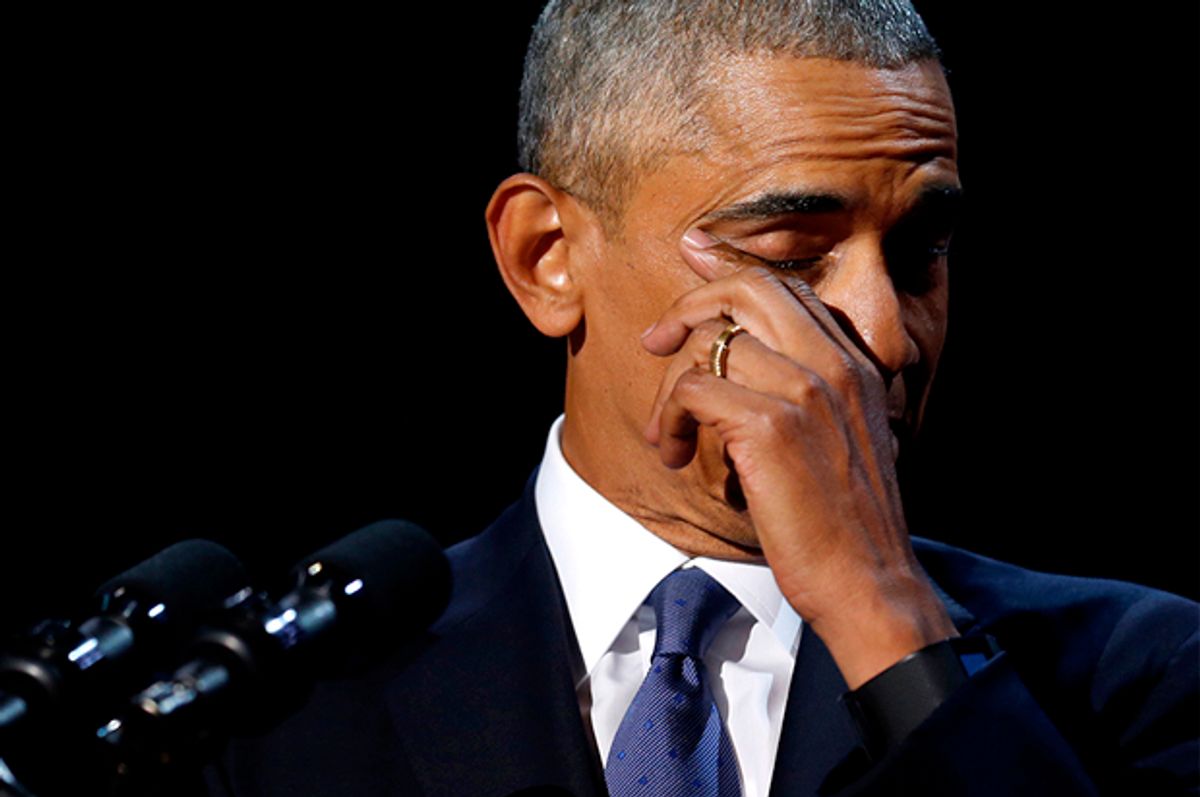Over the past seven decades, I’ve been a trusted literary confidant and adviser to nearly every American president. FDR, toward his end, praised my World War II novel “The Naked Grunt” as “the finest work of American literature to emerge from the battle-swamps of occupied Asia.”
Eisenhower enjoyed “The Swingin’ Jew,” my column in Golf Digest, and JFK often had me over to discuss “Horny Housewives,” my proto-new journalist work on the early days of the sexual revolution. Ronald Reagan loved my children’s series,“Skip Seaborn: The All-American Athlete Who Was Not Gay,” and Bill Clinton was an admirer of my translation of “One Hundred Years of Solitude.” He told me the pages were “superabsorbent.”
But never has the Oval Office housed a champion of literature quite like Barack Obama.
He had me over to the house last week, at long last, for a literary lunch with several talented but nonetheless lesser writers of a younger generation. We sat there in the antechamber: me, my former student Zadie Smith; Junot Díaz author of “The Unbearable Oscar Woo Woo,” Colson Whitehead, who recently enjoyed a huge success with his excellent novel “The Underground Intuitionist,” Barbara Kingsolver, who wrote “The Giving Tree,” and a relative unknown named Danny Eggleston. We all eagerly anticipated an audience with the most literary American who’s ever lived.
President Obama entered the room, beaming and sophisticated, carrying a copy of “Infinite Jest.” He shook everyone’s hand warmly. But his gaze held mine longest of all.
“The Greatest Living American Writer,” he said. “I never thought I’d see the day.”
“The honor is all mine, Mr. President,” I said.
“I would give you a Presidential Medal of Freedom,” he said. “But you already have two.”
“Presidents Nixon and Carter were most generous,” I said.
“Well, I have to say that your novel “Leon: A Man of the Streets” had an enormous effect on the way I see the world.”
“It influenced a generation,” I said.
“I also thought that one about the guy who couldn’t stop lactating.”
“Nipple envy,” I said.
“Yeah, that was really funny.”
The other writers stood around uncomfortably, as President Obama and I gazed, understanding each other across the generations in the way that only true intellectuals can.
“All right, braniacs,” he said, clapping his hands together. “Let’s eat!”
The conversation at lunch flowed like a Valrhona chocolate fountain. Obama asked us all about the obstacles we face as writers. Zadie Smith talked about the difficulty of staying creative while raising young kids. Junot Díaz discussed the problems of being young and nerdy in a culture soaked in machismo. Kingsolver talked about how worrying about the environment sometimes distracts from her art. Finally, it was my turn.
“It can get very drafty in the castle,” I said. “And if my beleaguered manservant Roger is in town buying seafood, I find the chill a bit distracting. Also, I miss my dear love Wally Trumbull, who died at the Battle of Midway so, so long ago.”
Obama placed his hand on his chin.
“Tell me more about yourself, Pollack,” he said.
We discussed our various charitable endeavors. Danny Eggleston talked about his series of nonprofit literary tutoring centers, an idea obviously stolen from my early-'50s Junior Greatest Living American Writer Giveaway, whereby young talent who collected the largest number of copies of my book would be permitted to enter a contest judged by me, James Agee, and the then-middle-aged Joyce Carol Oates. The winner of that first contest, Jack Kerouac, went on to some literary success, even though he obviously ripped off my 1952 book of countercultural essays, “Travels With Roger.”
For the next hour, we discussed all the great books by people named Jonathan and also by people not named Jonathan. We all agreed that without American literature, America would not have literature. Our stories, President Obama said, give citizens hope, and our words give their lives meaning — “especially,” he said, “Neal Pollack’s 1969 Rolling Stone cover story ‘The Motorcycle Whore of Hanoi.’”
“Now then,” the president said, “whom do you all think I should pardon next week?”
Chelsea Manning got six votes, Oscar Lopez Rivera got six votes. Leonard Peltier only got two votes. We sat around the table glowering at one another suspiciously, as writers do.
“I think you should free Nelson Mandela,” I said. “Bring him back home to Soweto.”
Everyone shifted in their chairs uncomfortably, but I didn’t understand why. None of them were old enough to have fought to end apartheid, which I did in my book “Cry, the Beloved Country That I Visited Once on Vacation.” These writers are but children. They haven’t lived the full drama like I have.
Too soon, though, our lunch was over. Obama, as he’s wont to do, bowed his head sadly in a solemn goodbye. As we headed out the door, he said, “Pollack.”
“Yes, Mr. President?”
“Would you sign my copy of “It Is Easy to Take a Lover in Cuba?” It’s my favorite of your Castro books.”
It has been my greatest honor to call a man like Barack Obama president. As America steers itself from calm, sophisticated literary waters into a storm-filled sludge of innuendo and racist cartoon frog memes, we will all miss his firm, intelligent grip on the issues and on our heartstrings. None of us will fully flourish without his weekly interview in The New Yorker.
Yet I refuse to believe that this is the end of American wordsmithing. My Twitter account is active, and I know that Donald Trump listens, late at night. Soon enough, he will warm to me, subtweet and summon me to the tower. And I will go gladly, for American writers serve no fixed master.
Also, I’ve always wanted to shit in a golden toilet.

Shares